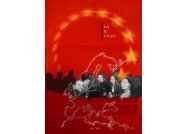turkish-greek civic dialogue - AEGEE Europe
turkish-greek civic dialogue - AEGEE Europe
turkish-greek civic dialogue - AEGEE Europe
You also want an ePaper? Increase the reach of your titles
YUMPU automatically turns print PDFs into web optimized ePapers that Google loves.
170<br />
MÜFIDE PEKIN<br />
VICE-PRESIDENT OF THE FOUNDATION<br />
OF LAUSANNE TREATY EMIGRANTS<br />
“The Turkish-Greek Civic Dialogue Project has been an extremely rewarding<br />
experience for both the initiators of the Project and for those who have<br />
been involved in it, either as participants or observers. Beyond the obvious<br />
importance of achieving and maintaining the venues for a Turkish-Greek<br />
<strong>dialogue</strong>, this endeavour has provided a landmark in engaging the youth to<br />
enhance the mutual understanding and trust between the two societies. Once<br />
again, the confidence in younger generations has proven its value when it<br />
comes to open-mindedness, common production and peace-oriented activism.<br />
I hope our young colleagues and friends feel the same way too.”<br />
It has been a special honour for the Foundation of Lausanne Treaty Emigrants<br />
to be involved in the Project as a partner. It is of course, one of the missions of<br />
the Foundation to support friendship and cooperation among Turkish and Greek<br />
youth with the aim of establishing a culture of peace. For that reason, the<br />
Foundation has approached the Project with special care and enthusiasm from<br />
the beginning and has envisaged it as one of the first steps that will pave the<br />
way to peace in the Aegean. In fact, “supporting friendship and cooperation<br />
among Turkish and Greek people with the aim of establishing a culture of<br />
peace” is stated as one of the objectives in the statute of the Foundation<br />
of Lausanne Treaty Emigrants. To this end, the Foundation has been and will<br />
be in the future putting great emphasis at organising seminars, conferences,<br />
symposiums, contests, concerts and similar events to realise these aims.<br />
“The preliminary contacts between the Foundation of Lausanne Emigrants and<br />
<strong>AEGEE</strong> - Ankara started in the year 2000. The beginning of the millennium was<br />
also the time when active work was started by a group of immigrant families to<br />
found a nation-wide organisation with the aim of preserving and regenerating<br />
the cultural identity and values of “Lausanne Emigrants” who were forced<br />
to leave their birth places in Greece to settle in a new homeland following<br />
the signing of the Treaty of Lausanne between the two countries, Greece and<br />
Turkey. During this period of preparation, which was to end with the official<br />
founding of our Foundation in May 2001, we made our first acquaintanceship<br />
with <strong>AEGEE</strong>-Ankara through the former exchange coordinator Cem Tüzüner.<br />
The year 2000 was declared as the “Year of Peace” by the United Nations. In<br />
this context, the Foundation and <strong>AEGEE</strong>-Ankara organised similar events and<br />
shared aims started their communication. This cooperation finally ended in a<br />
partnership when the Foundation’s project proposal to organise a symposium<br />
to commemorate the 80 th Anniversary of the Compulsory Population Exchange<br />
between Greece and Turkey was accepted by the Turkish-Greek Civic Dialogue<br />
project team of <strong>AEGEE</strong>-Ankara. The organisation of this symposium was to take<br />
place under the great project of the Greek-Turkish Civic Dialogue.”<br />
“What followed was months of preparation for an international symposium<br />
during which our information exchange with our partner was painstaking and<br />
exhausting at times. Needless to say, there were times of dissonance and<br />
misunderstandings between the partners during this long period of preparation<br />
which sometimes sprang from a lack of communication and the inexperience<br />
resulting from our side mostly in carrying out such a cumbersome task. Yet,<br />
with the determination, good-will and patience of both parties, all problems<br />
were resolved and the first ever academic symposium to be held in Turkey on<br />
this subject of the Compulsory Population Exchange was realised after 80 years<br />
on November 7-8 2003 in İstanbul.”<br />
“This symposium brought together a total of 26 academics from Turkey, Greece<br />
and one from England who presented papers on the various aspects of the<br />
Exchange. Presentations and the discussions following were centered around<br />
the political, social, historical aspects of the Exchange, its reflections on<br />
literature and issues concerning the conservation and preservation of cultural<br />
heritage left behind by the immigrants.”<br />
“The problem of minorities was another subject to be covered by symposium<br />
papers by academics of both countries. The symposium was received with<br />
ardent interest and attention by young academics, graduate and post-graduate<br />
students of Turkish and Greek Universities, families of immigrants, members<br />
of our Foundation and the media including TV channels from Turkey and<br />
Greece, the Turkish Section of BBC, and journalists of both countries and the<br />
distinguished “Economist”. The occasion was largely covered by newspapers,<br />
web-sites, radio programs and periodical articles in Turkey, Greece and<br />
England. In spite of all the hardships and obstacles faced during the process<br />
of preparation, our Foundation worked in close collaboration and solidarity<br />
in launching the publicity campaign of our project. Programs and related<br />
announcements appeared on the web-sites of both <strong>AEGEE</strong>-Ankara and the<br />
Final Conference Association des Etats Généraux des Etudiants de L’<strong>Europe</strong>







